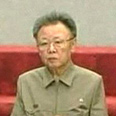
N. Korea to 'weaponize' its plutonium
Pyongyang rejects UN sanctions, says will never abandon nuclear programs
North Korea vowed on Saturday to embark on a uranium enrichment program and "weaponize" all the plutonium in its possession as it rejected the new UN sanctions meant to punish the communist nation for its recent nuclear test.
North Korea also said it would not abandon its nuclear programs, saying it was an inevitable decision to defend itself from what it says is a hostile US policy and its nuclear threat against the North.
The North will take "resolute military action" if the United States or its allies try to impose any "blockade" on it, the ministry said in a statement carried by the North's official Korean Central News Agency. The ministry did not elaborate if the blockade refers to an attempt to stop its ships or impose sanctions.
North Korea describes its nuclear program as a deterrent against possible US attacks. Washington says it has no intention of attacking and has expressed fear that North Korea is trying to sell its nuclear technology to other nations.
The statement came hours after the UN Security Council approved tough new sanctions on North Korea to punish it for its latest nuclear test on May 25. The resolution imposes new sanctions the nation's weapons exports and financial dealings, and allows inspections of suspect cargo in ports and on the high seas.
The South Korean government said it "welcomes and supports the unanimous adoption of the resolution." A Foreign Ministry statement said it showed the council's unequivocal intention to stop the North's nuclear program and its proliferation.
But a senior South Korean official said that North Korea may possibly respond to UN punishment with "another nuclear test and maybe more missiles." The official, who asked not to be named due to the sensitive subject matter, added that the communist country "will never, never give up their nuclear weapons."
Studies have shown that UN sanctions imposed on North Korea for missile testing and its only prior nuclear test in 2006 had almost no impact, while its meager trade actually increased due to lax enforcement of those measures.
Tensions in East Asia
North Korea has raised tension in the region in the past months by test-firing missiles, restarting a plant to produce arms-grade plutonium and holding the May 25 nuclear test, which put it closer to having a working nuclear bomb.
South Korea's defense minister said this week the North's saber rattling is to build internal support for leader Kim Jong-il, 67, as he prepares for succession in Asia's only communist dynasty.
Since Kim took over in 1994 and launched his guiding "military first" policy, the North's economy has grown weaker and an estimated 1 million people died in a famine in the late 1990s.
North Korea has been readying a missile that could hit US territory for a test launch by as early as this month and could also test fire mid-range missiles that can strike all of South Korea and most of Japan, South Korean officials have said.
UN measures
The new UN measures expand previous provisions to hit North Korea's arms trade, which is a key source of foreign currency for the destitute state that produces few other goods it can sell to the outside world.A study by the US-based Institute for Foreign Policy Analysis think tank this year estimated Pyongyang earns around $1.5 billion a year from missile sales.
During more than two weeks of negotiations on the draft resolution, the United States and Japan had pushed to authorize forced inspections of suspicious air, land and sea cargo. But diplomats said Russia and China had made clear they would veto the resolution unless the inspections were based on consent.
The resolution did speak of a "required inspection" if a ship refuses to be inspected. But the ship's flag country could then send the vessel to any port it chooses, where the local authorities would carry out any cargo inspection.
Kyodo news agency reported on Saturday that the Japanese cabinet would likely decide as early as Tuesday to impose its own sanctions, including suspending all trade. The punitive measures were expected to have only a limited impact, but Tokyo wished to demonstrate its strong opposition to the nuclear threat posed by the country, Kyodo said.










